Science Matters Summer Academy
COSAM Office of Outreach

CODE OF CONDUCT
Expectations:
- Show respect to other participants and treat them as well as they would like to be treated.
- Show respect to staff and cooperate fully with their instructions.
- Communicate in an appropriate manner. This means, refraining to use foul language or gestures, harsh words or an unkind tone of voice when talking to others.
- Conduct themselves responsibly and always take responsibility for their own words and actions.
- Refrain from horseplay and unwelcome teasing.
- Refrain from deliberately causing physical harm to other participants or staff. Participants will not push, kick, hit or fight with another student.
- Respect the property of others. This means they will use program equipment, supplies, and facilities properly and ask permission before taking/touching others’ materials and belongings.
- Be fully responsibly for their words and actions.
- Turn off cell phones during the Science Matters program.
Prohibited Activities:
In a program as short and intense as Science Matters, it is important that behavioral matters be addressed promptly and decisively. While most student behavioral concerns are resolved through meetings with or intervention by Science Matters staff, certain actions by students constitute clear-cut and serious violations of program policies and, in some cases, state or federal laws. Students who engage in the following actions* will be immediately removed from the classroom and a parent will be called to meet with the staff to resolve the problem if possible. A repeat offense by the students will result in the student being removed from the program permanently.
- Fighting, including hitting or pushing another person either as an aggressor or in response to the aggressive or irritating actions of another.
- Social dishonestly including, but not limited to, vandalism or theft.
- Reckless, disruptive, damaging, or otherwise uncontrolled behavior in the classroom, outdoors, or on a field trip.
- Use of profane language.
- Traveling outside of the designated campus area boundary or leaving campus without permission or supervision.
- Risky behavior that may endanger the student’s safety or the safety of others.
- Verbal of physical harassment of students or staff including, but not limited to, bullying and the playing of pranks or practical jokes that aim to harm others.
- Tampering with fire extinguishers, hoses, or alarms and damaging or defacing Science Matters or Auburn University property; participants bear financial responsibility for damages caused by their conduct.
- Possession of weapons of any kind including, but not limited to, pocket knives, Swiss Army knives, mace, or pepper spray.
*Please note that this is not a comprehensive list of potential violations. The Science Matters Staff and Auburn University reserve the right to dismiss a child from the program for any behavioral concern, which they deem inappropriate.
Consequences:
Behavior problems in the Science Matters Academy are rare in occurrence and are often less severe offenses than the actions listed in the prohibited activities section above. We are sensitive to the fact that our participants are in elementary school and there we engage in the positive reinforcement of good behaviors through daily and weekly prize boxes. In the event of less severe offenses, we will generally follow the below series of consequences.**
- 1st Offense: Verbal Warning/Reminder of appropriate behavior
- 2nd Offense: Five minute break from activities
- 3rd Offense: Phone call to parent letting them know of the situation
- 4th Offense: Dismissal from that day of the program
- 5th Offense: Dismissal from the remainder of the program
**Please know that all situations are handled on a case-by-case basis and this sequence may not be followed in every situation.
